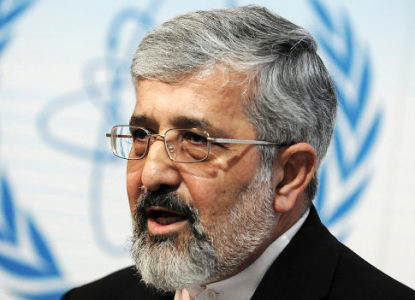Azerbaijan, Baku, Feb. 28 / Trend D.Khatinoglu. S.Isayev/
The Iranian ambassador to the International Atomic Energy Agency Ali Asghar Soltanieh told Trend during an interview on ،Thursday that Iran does not have any obligation to answer the IAEA's questions out of his commitments mentioned on Non-Proliferation Treaty. However, Iran and the Agency can schedule and agree on a framework to solve some doubts around Iran's nuclear activities.
IAEA inspectors, including two military experts had earlier travelled twice to Tehran to inspect Iran's nuclear programme. Iranian officials said that inspecting nuclear facilities are not in Agency inspectors' remit, but after finishing the second round of talks, IAEA chief Yukia Amano announced that Iran had not allowed inspectors to visit the Parchin military complex.
"It is disappointing that Iran did not accept our request to visit Parchin during the first or second meetings," IAEA Director General Yukiya Amano said on Feb.21.
Mr Soltanieh said: "The IAEA had some questions for Iran based on 'alleged studies' offered by some Western countries around what called "suspicious military aspects of Iran's nuclear programme" and we accept giving an answer and clarify all doubts.
"This was very important step that Iran took because answering all of those allegations was beyond the IAEA members' legal commitments based on the NPT.
We do not have any legal obligation to show our military sites to IAEA."
Western countries alongside the International Atomic Energy Agency (IAEA), doubt Iran's nuclear goals, accusing it of a probable military dimension of its disputed nuclear programme. So far, the UN Security Council has imposed four rounds of resolutions on Iran asking it to halt its uranium enrichment programme and accept the additional protocol of the Non-Proliferation Treaty (NPT).
Iran's main military manufacturing site at Parchin, near Tehran, has been suspected of carrying out nuclear tests since 2004.
"We should first negotiate with the IAEA to define an agreement and commitments and duties for both sides should be specified, then the IAEA can request visiting Parchin," Mr Soltanieh added.
IAEA former chief Mohammad Elbaradei asked Iran to show its Parchin activities in 2004 when rumours arose around the subject that Iran has been conducting secret experiments involving 'high-explosive shaped charges with an inert core of depleted uranium (uranium from which most of the fissile isotope uranium-235 has been removed) to test the characteristics of an implosion type nuclear weapon.
Depleted uranium (DU), a waste product of uranium enrichment, has several military applications. It has been used as armour-piercing ammunition in international military conflicts and claimed to contribute to health problems.
Iran denied the allegations, but allowed the IAEA to inspect there twice in 2005. IAEA reported in February 2006 that inspectors 'did not observe any unusual activities in the buildings visited' and that 'environmental samples did not indicate the presence of nuclear material'.
Tension rose around Parchin again when in November 2011, IAEA Chief Yukia Amano said during a report that he suspected that Parchin was the site where explosives relating to nuclear weapons had been tested in recent years.
This time Iran refused to allow a team from the U.N. nuclear watchdog agency to visit its military base at Parchin.






